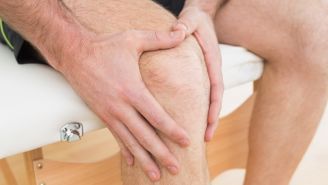Psoriatic arthritis, also called PsA, is a form of arthritis that affects people who have psoriasis. While exact numbers are hard to pin down, research estimates that 20 to 30 percent of people with psoriasis will develop PsA.
Like psoriasis, PsA is an autoimmune disease, where a misdirected immune system attacks healthy tissue—in this case, the tissues that make up the joints. Symptoms include inflammation, pain and stiffness. Over time, PsA can be disabling, causing permanent damage to the joints, deformity and loss of mobility.
There is no cure for PsA, but treatment can help slow disease progression and minimize damage. Just as with psoriasis, treatment typically involves a prescription medicine as well as a self-care routine. With psoriasis, self-care means finding and following a skincare routine. With PsA, self-care involves exercise.
Though exercise may be the last thing you feel like doing when your joints are stiff, physical activity is needed to improve and maintain range of motion, muscle strength, flexibility and overall health.
Below are some ideas for exercises recommended for managing PsA. Remember to talk to your healthcare provider before starting a psoriatic arthritis exercise program, to make sure that type of exercise is appropriate for you.
Also remember to choose activities you enjoy, which will make it easier to exercise regularly and consistently.
Yoga
Yoga is a centuries-old practice with numerous styles that vary in intensity. Beginners will want to look for a Hatha yoga class, which focuses on basic postures and mindful breathing done at a slow, friendly pace. More advanced athletes and practitioners may want to try Ashtanga yoga, which moves at a faster rate and with poses that are more demanding on strength and balance.
There are numerous benefits of practicing yoga for psoriatic arthritis. Yoga can help relieve stiffness, ease pain and improve range of motion. Yoga is also recommended as one way to reduce the emotional and psychological stress that can trigger and exacerbate psoriasis flare-ups.
Swimming
Swimming is an excellent psoriatic arthritis exercise. It improves cardiovascular health, strengthens muscles and it’s low impact—water’s buoyancy takes weight and pressure off your joints, which means working out in a pool doesn’t involve any of the hard impact you get with activities like running and aerobics. Also, swimming laps isn’t the only exercise you can do in a pool. You can also try aqua jogging or take a water aerobics class, which are offered at many gyms.
Remember that exposure to chlorine can dry out the skin, which may aggravate psoriasis—be sure to shower and moisturize right after you get out of the pool.
Cardio, strength and stretching
If yoga and swimming aren’t your thing, there’s nothing wrong with a gym routine. Your workouts should have three essential components:
- Stretching and mobility exercises, which help maintain flexibility and range of motion.
- Strength training, such as working with weights, resistance bands or doing bodyweight exercises. Stronger muscles take pressure off the joints. Be cautious with heavy weights, which can put too much stress on the joints.
- Endurance training, such as cycling, working out on an elliptical machine, walking or another low-impact activity. For added benefit, exercise outdoors to spend some time in the sun. Sunlight is important to vitamin D production, and research has shown an association between low levels of vitamin D and inflammation.
If you’re unsure of how to start a psoriatic arthritis exercise program, consider working with a physical therapist who can help you build a routine geared toward your specific needs and also teach you proper technique for the exercises you will be performing.






